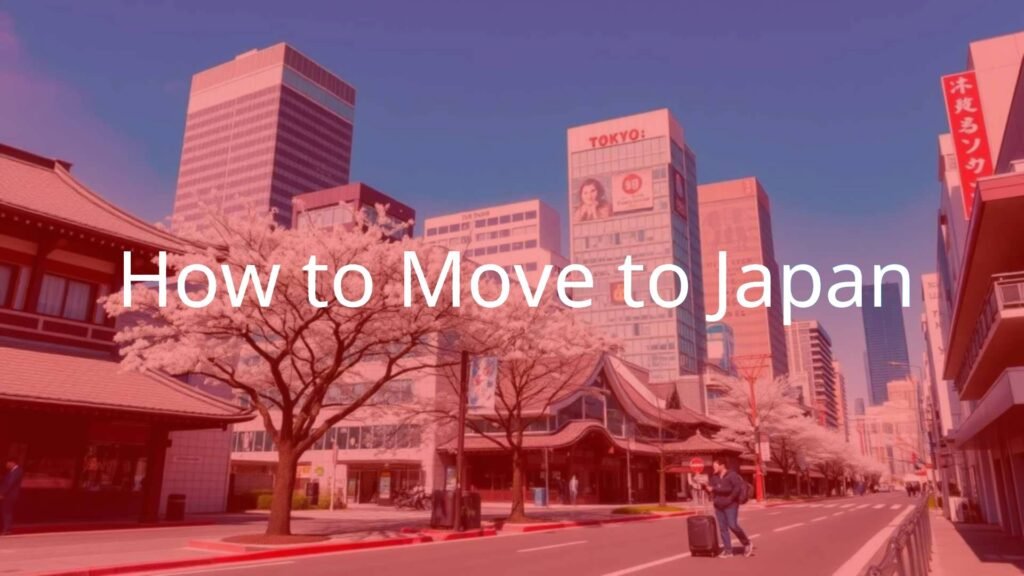Many people dream of moving to Japan, and it is very possible to make this dream a reality. Although the idea can feel overwhelming at first-especially because Japan has a different culture and language-the process is more manageable than you might expect. Whether you’re planning a short stay or a more permanent move, with the right planning and knowledge of your options, you can start a new life in Japan.
This guide will walk you through the main steps, things to think about, and important details for moving to Japan. We’ll cover visa rules, daily life, and all the main things you need for a smooth move.
Why Move to Japan?
Advantages of Living in Japan
Japan is special because it mixes old traditions with modern technology and urban life. The country is known for its high quality of life, reliable public transport, very low crime rates, and clean streets. You’ll notice how safe the cities feel and how well-kept public spaces are.
Besides these practical things, Japan is full of culture. You can enjoy cherry blossoms, ancient temples, busy city life in places like Tokyo, and world-famous food. There are many customs to learn and new foods to try, which makes everyday life interesting and new.

Common Reasons People Move
People move to Japan for all sorts of reasons. Some want to dive into the culture, learn Japanese, or study things like martial arts or flower arrangement. Others come for jobs, especially in IT, finance, and teaching English, because there is a need for foreign workers. Many people are also drawn to Japan’s stability and feeling of safety. Due to current currency rates, Japan can also be affordable for some. Most of the time, a mix of career, lifestyle, and safety pulls people to start over in Japan.
Possible Challenges and Getting Used to Life
While Japan has a lot to offer, it’s good to be realistic. Living there is different from visiting. The language can be tough, and you’ll likely need at least some Japanese. Everyday tasks-like setting up a bank account or seeing a doctor-can be harder without language skills. The culture values manners, polite communication, and following rules, which can take some getting used to. Housing tends to be smaller, and some landlords may not want to rent to foreigners. If you keep an open mind and are willing to learn, these difficulties can turn into growth experiences and make your stay more enjoyable.

Who Can Move to Japan?
Basic Requirements for Foreigners
If you are not a Japanese citizen or married to someone who lives in Japan, you will need a visa to move there. The rules depend on what type of visa you want-there are 27 kinds in total, such as working, studying, or family visas. Usually, you’ll need a valid passport, a clear reason for your stay, and proof that you can support yourself financially.
For a work visa, you usually need a job offer from a company in Japan and any qualifications needed. If you want a student visa, you must be accepted by a school in Japan and show you have enough money for school and living expenses. The Japanese government supports real visa applications that follow the rules, so as long as you qualify, approval is likely.
Rules for Certain Nations
Visa rules can be different depending on your country. For instance, people from 67 countries can visit for up to 90 days without a visa, but there are exceptions (like Thailand and Brunei, which only get 15 days). Check the latest rules with Japan&rsquos Ministry of Foreign Affairs.
Japan doesn’t give visas on arrival. Also, if you travel in and out of Japan too often on short-term stays, immigration officials might question your reasons and could refuse entry. Make sure you understand the specific rules for your nationality before you apply.
How to Pick the Best Visa for Japan
Figuring out which Japanese visa you need seems tricky, but your main reason for moving will narrow the options. Japan offers different visas for short visits, work, study, and family reasons. Picking the right one is step one because it decides what you will be allowed to do in Japan.
To help make this easier, let’s look at the most popular visas and what’s needed for each one.
Tourist Visas: Short Visits
If you just want to visit for a short time, a tourist visa or “visa exemption” (depending on your nationality) is all you need. Most tourists don’t need a visa for trips up to 90 days. A passport and return ticket are usually enough. Be sure not to overstay, as Japan takes violations seriously-this could stop you from returning for a long time. Medical insurance isn’t required for short trips, but it’s good to have in case of emergencies. Companies like SafetyWing offer plans that cover medical needs up to $250,000.
Work Visas: For Skilled Workers and Teachers
To work in Japan, you need a work visa. There are 14 main types, but the “Specialist in Humanities/International Services” is common for jobs like teaching English, engineering, and IT. Most of these require a bachelor’s degree (or 10+ years’ experience in your job type) and a job offer in Japan. Your employer usually helps get your Certificate of Eligibility (COE), an important step that makes the main visa application easier.
Teaching English is a popular way in for native speakers. Schools like Berlitz and ECC hire foreign teachers, and even non-native speakers with strong English and education backgrounds may be hired. Work visas often start as 1-year permits but can be renewed. You can also change jobs within Japan as long as your visa is still valid.

Student Visas
Student visas are great for learning the language or studying in Japan. You need an acceptance letter from a school, university, or language center, and the school will help you get your COE. You also must show you have enough money (about 2 million yen or $15,000 USD, not counting school costs). Family or scholarships can be used if you don’t have the savings yourself, but you’ll need proof. Student visa holders can work up to 28 hours per week to help pay costs.
Working Holiday Visa (For Younger People)
The Working Holiday Visa lets people from certain countries (26 by 2025, such as Australia, Canada, the UK, and most of Europe-not the USA) live and work in Japan for up to 18 months (usually split into three six-month periods). The usual age is 18 to 30, sometimes 25. You must show you have funds (about $2,500 to $4,000 USD) and a return ticket. You can work in most industries except adult entertainment and gambling. This visa is perfect for those who want to see Japan and earn money at the same time.
Dependent and Spouse Visas
If you’re married to a Japanese citizen or a foreigner with a legal long-term stay, Dependent and Spouse visas can help you join them in Japan. The Spouse visa lets you work in any field and makes you eligible for permanent residency after three years. You’ll need to show proof of marriage, shared living arrangements, and income. Children of foreign residents can also qualify for Dependent visas, so families can stay together.
Specified Skilled Worker and Digital Nomad Visas
The Specified Skilled Worker visa started in 2019 for jobs in 10 industry fields. It lasts five years and requires you to be 18 or older, know some Japanese (JLPT N4), and pass a skills test. This visa can’t be renewed, doesn’t lead to permanent residency, and doesn’t allow dependents-yet. The Digital Nomad visa, new in 2024, lets people live in Japan for six months while working remotely, as long as you earn at least 10 million JPY (about $70,000 USD) a year. This visa also lets you bring your family, which is a big plus for remote workers.
Main Steps to Move to Japan
Once you pick your visa, you can start the moving process. This stage mostly involves paperwork, planning, and organizing your money. The exact order may change depending on your visa type, but here’s a basic checklist to help you stay on track:
- Prepare Your Documents: Collect and fill out everything you need, such as your Certificate of Eligibility, passport, visa application form, photos, and proof of funds or other details (like school transcripts or marriage papers).
- Secure a Job or School Spot: For a work visa, get a job offer; for a student visa, apply and be accepted by a school. Job boards like Japan Dev or websites like LinkedIn can help you find work, especially in engineering and teaching.
- Plan Your Budget: Moving, especially to major cities, can be costly. Make a budget that covers flights, temporary housing, shipping, daily expenses, and any extras if you have pets or family.
- Find Housing: Research short-term (hotels or rentals) and long-term (apartments or houses) options. Only about a quarter of rentals may accept foreigners, and you might need a Japanese guarantor. Get help from real estate agents who work with foreigners.
- Book Your Flight and Insurance: Once your visa is approved, book your travel. Get travel insurance for the trip and early days in Japan. For longer stays, you’ll need to sign up for Japan’s National Health Insurance soon after you arrive.
Tips for an Easy Move to Japan
Visit Before You Move
If possible, spend at least a month in Japan before you officially move. This gives you time to get used to normal life, explore neighborhoods, and see what it’s really like-not just as a tourist. You’ll be better prepared for things like daily commute, apartment sizes, and local customs.
Avoid These Mistakes
- Not Learning Japanese: Even basic Japanese will make life easier and give you more job options. Start with apps like Duolingo.
- Underestimating Costs: Life in big Japanese cities can be expensive. Research costs and keep a money buffer.
- Booking Flights Too Early: Wait for your visa approval, because delays happen, especially with the COE.
- Forgetting Documents: Japan requires a lot of paperwork. Bring originals and copies of official records and be patient-things may take time.
- Romanticizing Japan Too Much: Love the experience, but remember every place has ups and downs.

Helpful Resources
Check out these sources for more guidance:
- Job, housing, and cost info: GaijinPot, Real Estate Japan, Numbeo
- Language learning: Duolingo, Preply, Japademy
- Tax info: Bright Tax, JETRO
- Community support: Facebook expat groups, Internations
- Job recruiters: Morgan McKinley, Michael Page
Language and Culture
To truly settle into Japan, you’ll need more than just an address. Knowing the language and understanding basic social rules will help your daily life go smoothly and help you make friends.
Learning Japanese
Start learning Japanese before you arrive. Apps like Duolingo and platforms such as Japademy are good starting points. Even simple greetings, directions, or ordering food will help your everyday life. People in Japan appreciate your effort, even if your Japanese isn’t perfect, and it’ll boost your chances for better jobs.
Dealing with the Language Gap
Even with some Japanese, you’ll run into times when communication is tough. Use a translation app and basic gestures to get your point across. For important situations (like banking or doctor visits), bring someone who speaks Japanese or find services that help foreigners. Treat every tough moment as a learning opportunity.
Japanese Customs and Good Manners
Japanese culture focuses on respect and harmony. Common practices include bowing, taking off shoes indoors, not talking loudly in public, and accepting business cards politely. Try not to eat or drink while walking, and use both hands when giving or receiving things. Quiet behavior is normal, even in crowded places like trains. Following these basic manners will help you get along and avoid misunderstandings.
How to Bring Your Belongings and Pets
Bringing your stuff and your pets to Japan takes planning but is possible. You’ll need to follow customs rules and, for pets, health checks and possibly quarantine.
Shipping Your Things
Prepare a detailed list of all your items, preferably in Japanese and English, for customs. Items you’ve owned for at least six months usually enter duty-free. Work with a moving company that knows how to handle moves to Japan-they’ll help with paperwork and shipping steps. Expect some delays and to fill out customs forms when your shipment arrives.
Bringing Pets
You can bring dogs and cats to Japan, but you’ll need to start paperwork early-up to a year ahead. Your pet needs a microchip, rabies shots, antibody blood tests, and a health certificate. After arriving, pets usually have a seven-day quarantine. If steps are missed, quarantine may be longer. Other animals have different rules, sometimes stricter, so check ahead. Follow all the rules carefully to make sure your pet can join you without problems.
Finding a Place to Live in Japan
Rental Steps for Foreigners
Only about 20-30% of rentals in Japan accept foreigners. It helps to use an agent who is used to working with non-Japanese clients. Expect to provide proof of employment, income, and sometimes a guarantor. Rental contracts are usually for one or two years and include renewal fees. Most apartments are smaller than Western ones, but careful searching can land you a good spot.
Deposits and Guarantees
Renting in Japan involves paying:
| Item | Details |
|---|---|
| Shikikin (Deposit) | 1-2 months’ rent, refundable if no damage |
| Reikin (Key Money) | Gift to landlord, 1-2 months (non-refundable) |
| Agent Fee | 1 month’s rent, plus tax |
| Advance Rent | 1 month’s rent |
Most landlords want a guarantor who will cover your rent if you can’t pay. If you don’t know anyone in Japan, agents can find a guarantor company for a yearly fee.
Short-Term vs. Long-Term
You might want to start in a hotel or guesthouse as you get set up. Once you have a Residence Card and feel more settled, you can look for a long-term apartment. Many do short-term at first to make searching easier and to view places in person before signing a longer lease.
What to Do When You Arrive in Japan
Register Where You Live
After landing in Japan, get your Residence Card (Zairyu Card) at the airport. Within two weeks of moving into your new address, take this card to your city or ward office to register your address. You’ll need this for health insurance, banking, and many other things. Always carry your Residence Card with you.
Sign Up for Health Insurance and Open a Bank Account
If you’re on a visa for three months or more, you must join Japan’s National Health Insurance within two weeks of registering your address. This costs about 2,000 JPY per month at first and pays for most medical needs. Setting up a bank account requires your visa, passport, Residence Card, a Japanese address, and a phone number. It may take a few days to get a bank card, so have some cash or an international card for your first week.
Set Up Phone and Internet
Once you have your Residence Card, get a local mobile phone plan. Big carriers include Docomo, au, and SoftBank, but you can also use cheaper options called MVNOs. For home internet, fiber optic is fastest but can take time to set up. For short stays or while waiting, use a prepaid SIM or pocket Wi-Fi.
Getting Around
Japan has a very reliable public train and subway system, especially in cities. You probably won’t need a car in urban areas. Get a reloadable IC card (like Suica or Pasmo) for trains, buses, and even shopping at convenience stores. The bullet trains (Shinkansen) make travel between cities easy and quick. Learn train etiquette: don’t talk loudly and line up for car doors.
Money and Legal Matters
Taxes and Social Payments
If you work in Japan, you’ll pay income tax and local resident tax, usually taken from your pay. There’s also social security, which covers health and pension. These systems can be confusing, so ask your employer or a tax expert for help to avoid problems.
Keeping Your Visa Legal
Always keep your Residence Card up-to-date-if you move, report your new address within 14 days. Stick to the rules of your visa, such as not working outside the permission. To renew, apply before your visa expires, usually through your job or school. Follow all rules so you can stay in Japan without trouble.
Important Documents
- Residence Card (Zairyu Card)
- Passport
- Visa permit in your passport
- My Number Card (for tax and social security)
- Bank book or card
- Health insurance card
- Hanko (personal stamp; still required for some official tasks)
Keep these and digital copies handy, as you will need them often.
Settling In and Living Well in Japan
Making Friends and Building Connections
It can take time to make friends but Japan has large expat groups, both online (e.g., Internations, Facebook expat groups) and in person. You can also join clubs, language exchanges, or local classes to meet both Japanese and foreign friends. Volunteering is a good way to make contacts and help your new community. Many Japanese people are happy to practice English, which can make making connections easier.
Growing Your Network
Professional and social networking are important for long-term success. Go to work events, use LinkedIn, and think about joining professional groups. Recruitment agencies are widely used for job hunting in Japan. For social experiences, join classes, sports, or interest groups-you’ll learn more about Japanese society this way.
Getting Help
If you need help, go to your employer or school for advice. Many places provide support for foreigners, including language schools and healthcare info services like Ubie and Japan Healthcare Info. If you have bigger issues or emergencies, contact your country’s embassy or consulate. Don’t be afraid to reach out or ask questions-there are many services ready to help you settle in Japan.
- What Is a Maiko? - July 13, 2025
- What Does Domo Arigato Mean? - July 12, 2025
- What Does Naruto Mean? - July 12, 2025









